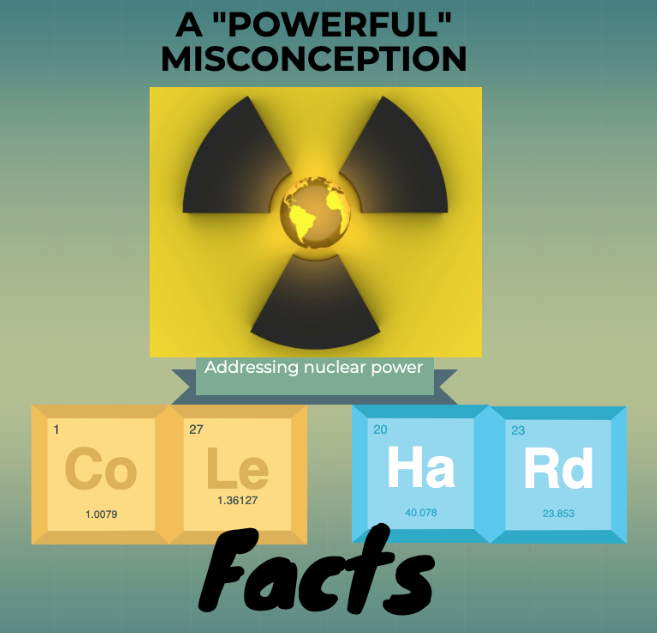Cole Hard Facts: A “powerful” misconception
Addressing the common and consequential misconceptions surrounding nuclear energy with the facts.
April 12, 2019
The word nuclear implies danger, distress, and death. However, fostering this narrow mind map of connotations is what truly threatens citizens.
Nuclear energy and power plants have seen massive cutbacks and reductions despite their substantial efficiency and effectiveness. This continuous contraction is due to a popular and ultimately harmful misconception of nuclear power presenting dangers to the environment and local community through carbon emissions and possible catastrophic malfunctions.
According to cognitive psychologist, linguist, and popular science author Mr. Steven Pinker, nuclear power is the world’s most abundant and scalable carbon-free energy source.
A nuclear reaction, which nuclear power is based upon, provides an immense amount of energy, while imposing a diminutive fraction of the environmental pollution which mining coal, oil, or gas poses. In addition, the land mass necessary for large amounts of energy is one-five-hundredth of the land needed by wind or solar.
Nuclear power has a lower carbon footprint for nuclear power than solar, hydro, and biomass, which comes as a surprise to many Americans.
If nuclear power harbors all these positives and seems the obvious choice over its competition, then why is there a diminishing usage in western nations?
An unfortunate association between nuclear power and nuclear bombs stemmed from Cold War America, and has reared its head in post-war America and currently around the world as nuclear power is commonly conceived as exceptionally more dangerous than it is in reality.
To specify, nuclear power fosters some possible negatives and in the most unique circumstances, it can be dangerous. These circumstances include a terrorist attack, some form of plant error, or a natural disaster leading to malfunction of the plant.
The instances of disaster, however, have been few and far between, as only three major reactor accidents have occurred since the institution of nuclear power and they have combined for 56 attributed deaths.
The 1979’s Three Mile Island accident and 2011’s Fukushima accident did not kill anyone, yet were both immensely publicized and produced perceptions of serious loss of life. The one instance of true catastrophe was Chernobyl in 1986 in Soviet-run Ukraine, where 56 deaths were the product of severe ineptitude and incapability by the Soviets running the plant. A delayed and careless response to the accident by authorities compounded the plant employees’ incompetency, leading to many more deaths than necessary.
Some people fall victim to a cognitive association between nuclear power and nuclear bombs, and believe a malfunction could lead to catastrophe of atomic bomb detonation magnitude. This is very far from the truth, as a nuclear bomb is designed in a strategic way to produce destruction, nothing close to the configuration of nuclear reactors, according to the Center for Nuclear Science and Technology, a center which makes the complex nuclear world easier to understand for the general public.
To understand the 56 deaths previously discussed with a foundation of context, one must recognize the astronomical deficit in nuclear energy deaths compared to its energy producing counterparts. Hydroelectric power alone was responsible for 171,000 deaths when the Banqiao hydroelectric dam failed in China in 1975. Mining for fossil fuels has also proved dangerous and recent estimates from BBC news suggest 5.5 million people die annually due to air pollution.
Even wind power has managed to kill more than 100 people since 1990.
Making nuclear power even more appealing, engineers have learned from past accidents and near-misses, and therefore continuously progressed the safety of nuclear reactors leading to a reduction of risks, and a possible significant reduction of environmental contamination as it replaces fossil fuels, according to Mr. Pinker.
Ultimately, this misconception may seem minor right now, but the repercussions will be felt tremendously as the upcoming decades pass. Each time a plant closes, a politician ignorantly endorses fossil fuels through policy, or a sector of the public falls under this nuclear misconception, environmental progress is halted and deteriorated.
Once Americans and the rest of the world overcomes this misconception, society can start to have pragmatic and considerate discussions regarding its energy sources, and the ill-effects of carbon emissions such as climate change can be combated.
“It’s often said that with climate change, those who know the most are the most frightened, but with nuclear power, those who know the most are the least frightened,” Mr. Pinker said.






















































